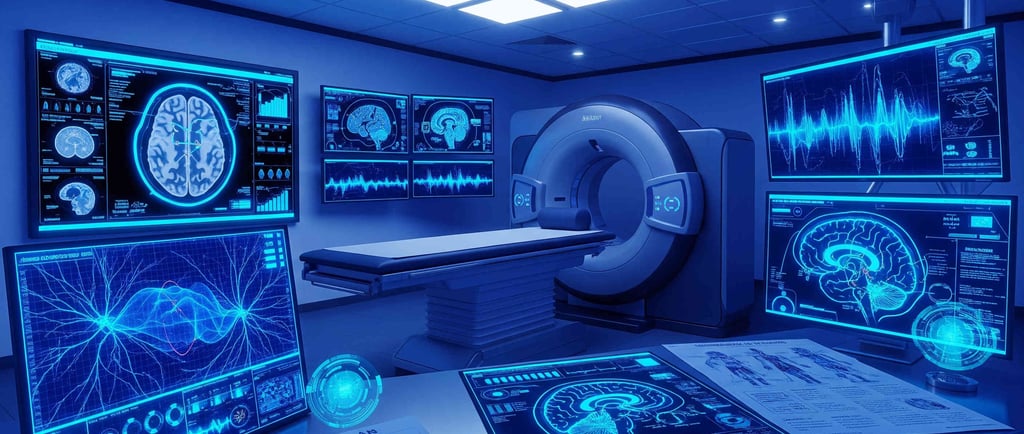The Patients Who Remember Things That Never Happened
Dr. Rebecca Fletcher documents a troubling pattern: patients with detailed memories of medical procedures that appear nowhere in their official records. When brain scans show evidence of undisclosed neural interface exposure, she begins to suspect these aren't cases of false memory syndrome—but evidence of undocumented human experimentation. A fictional medical perspective exploring real concerns about emerging neurotechnology and medical ethics.
CHARACTER PERSPECTIVES
Dr. Rebecca Fletcher
4 min read


I've been working in emergency neurology for eight years, and I thought I'd seen everything. Stroke patients, trauma cases, seizures that defied explanation—you learn to expect the unexpected in this field. But lately, I've been encountering a pattern that has me questioning everything I thought I knew about memory and medical records.
It started three months ago with a patient I'll call Michael. He came in after a minor fender-bender, complaining of headaches and confusion. Standard procedure for potential concussion. But during my examination, something unusual happened.
Michael began describing, in vivid detail, a childhood surgery he'd had to remove his appendix when he was twelve years old. He remembered everything: the hospital room number (237), the surgeon's mustache, even the taste of the orange Jell-O they gave him afterward. He showed me a small scar on his abdomen as evidence.
The problem? When we pulled his medical records, there was no record of an appendectomy. Ever. And when I examined the "scar," it appeared to be nothing more than a slight variation in skin pigmentation—not surgical scarring at all.
The Pattern Emerges
Over the following weeks, I encountered four more patients with similar presentations. Each one described detailed medical experiences that, according to their official records, never occurred:
• Sarah, 34, who vividly remembered a week-long hospitalization for pneumonia at age 16, complete with specific medication names and nurse interactions. Her pediatric records showed only routine check-ups.
• James, 41, who described undergoing experimental cognitive testing at a research facility as a college student, including details about electrode placement and brain scans. The facility he named existed, but had no record of him ever participating in any studies.
• Linda, 28, who recalled multiple childhood visits to a neurologist for "concentration problems" and receiving medication that made her feel "different." Her parents confirmed she'd never had such issues, and pharmacy records showed no prescriptions for cognitive medications.
The Medical Literature
Initially, I assumed these were cases of false memory syndrome—a documented phenomenon where patients develop vivid but incorrect memories, often related to therapy or suggestion. The False Memory Syndrome Foundation has documented numerous cases where patients become convinced of experiences that never occurred, typically involving childhood trauma.
But these cases were different. The patients weren't in therapy. They weren't seeking compensation or attention. And the false memories weren't traumatic—they were mundane medical procedures that should have left paper trails.
Unexplained Neurological Presentations
What's more troubling is that many of these patients were presenting with medically unexplained neurological symptoms—a condition affecting an estimated 30% of neurology patients. Research shows that patients with unexplained symptoms often report more pain and neurological complaints than those with clear diagnoses.
But here's what's keeping me up at night: some of these patients are showing subtle brain activity patterns on functional MRIs that suggest their brains have been exposed to experiences they shouldn't remember having.
The Technology Angle
Recent advances in brain-computer interfaces have shown that implanted devices can now decode inner speech and thought patterns with up to 74% accuracy. Military-funded research has successfully tested "prosthetic memory" implants that can enhance or modify recall.
Even more concerning: MRI scans can malfunction or produce unusual readings when patients have undisclosed metal implants or devices. Several of my patients with unexplained memories show subtle imaging artifacts that could suggest previous exposure to neural interfaces.
Medical Record Discrepancies
Research confirms that discrepancies between patient reports and medical records are more common than we'd like to admit. Studies show that up to 55% of medical record discrepancies occur when conditions are documented by healthcare providers but not remembered by patients.
But what about the reverse scenario? What happens when patients remember detailed medical experiences that aren't in their records? Medical record tampering is a serious concern in malpractice cases, with legal experts noting that "discrepancies should be avoided at all costs."
Questions I Can't Answer
As I write this, I have seventeen active cases of patients presenting with detailed memories of medical procedures that, according to official documentation, never happened. These aren't confused elderly patients or individuals seeking compensation. They're young, mentally competent adults whose neurological exams are otherwise normal.
The questions haunting me:
• Could these patients have participated in undocumented research studies?
• Are we seeing the effects of experimental neural technologies being tested without proper consent?
• How many patients with "medically unexplained symptoms" are actually dealing with the aftermath of procedures that were deliberately hidden from medical records?
What I'm Doing About It
I've started maintaining a separate, secured database of these cases, documenting every detail the patients remember alongside their official medical histories. I'm also collaborating with colleagues in other cities to see if this pattern extends beyond Boston.
If you're a healthcare provider and you've encountered similar cases, I'd appreciate hearing from you. And if you're a patient who's experienced vivid memories of medical procedures that don't appear in your records, please know that you're not imagining things.
Something is happening here. Something that challenges everything we think we know about memory, medical ethics, and the technologies that may be influencing human consciousness without our knowledge.
________________________________________
Disclaimer: This is a fictional perspective from Dr. Rebecca Fletcher, a character in the neurothriller "Recallen: Entry Wound." While Dr. Fletcher's observations are fictional, they explore very real concerns about emerging neurotechnology, medical record integrity, and the documented phenomenon of false memory syndrome. All sources cited reflect actual current research and medical concerns.
________________________________________
Additional Reading:
• False Memory Syndrome Foundation Research - https://en.wikipedia.org/wiki/False_memory_syndrome
• Medically Unexplained Neurological Symptoms - https://www.amjmed.com/article/s0002-9343(15)00352-6/fulltext
• Brain Scans Show Detectable Activity in Unresponsive Patients - https://www.nbcnews.com/health/health-news/brain-scans-unresponsive-patients-show-detectable-activity-rcna166664
• Military-Funded Memory Prosthetics Research - https://www.livescience.com/62234-prosthetic-memory-neural-implant.html
• Brain-Computer Interfaces Decode Inner Speech - https://www.livescience.com/health/neuroscience/new-brain-implant-can-decode-a-persons-inner-monologue
• Medical Record Discrepancies in Patient Care - https://pmc.ncbi.nlm.nih.gov/articles/PMC3364863/
Explore
Dive into the world of neurothrillers.
Connect
subscribe
© 2025. All rights reserved.
